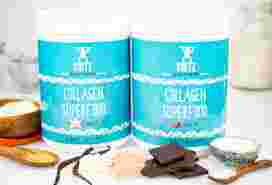What is Collagen?
Collagen is the most abundant protein in the human body , making up about one-third of total protein. It serves as a structural building block for skin, bones, muscles, tendons, ligaments, and connective tissues. In simple terms, collagen is like the glue that holds the body together.
As we age, our body naturally produces less collagen. By the time we reach our 30s, collagen levels start to decline, leading to visible signs of aging such as wrinkles, sagging skin, weaker joints, and reduced bone density. This is why adding collagen superfoods to the diet has gained so much popularity.
Why is Collagen Called a Superfood?
The term superfood refers to nutrient-dense foods that provide exceptional health benefits. Collagen is considered a superfood because it supports multiple systems in the body at once. Unlike typical proteins, collagen contains unique amino acids such as glycine, proline, and hydroxyproline, which play a critical role in skin elasticity, wound healing, and joint lubrication.
By consuming collagen-rich foods or supplements, you’re not just giving your body extra protein—you’re providing specialized nutrition that targets anti-aging, joint care, gut health, and overall wellness.
Health Benefits of Collagen Superfood
1. Improves Skin Health and Slows Aging
Collagen is widely recognized for its skin-rejuvenating properties. It helps maintain elasticity, hydration, and firmness. Research shows that collagen supplementation can reduce wrinkles, improve skin texture, and promote a youthful glow.
2. Supports Joint and Bone Health
Collagen plays a vital role in maintaining cartilage, the tissue that cushions joints. With age, cartilage weakens, leading to stiffness and discomfort. Collagen superfoods can reduce joint pain and improve flexibility, making them especially beneficial for people with arthritis or active lifestyles.
3. Strengthens Hair and Nails
Weak and brittle nails, along with thinning hair, are often linked to collagen deficiency. Collagen provides the amino acids necessary to build keratin, the protein that makes up hair and nails. Regular intake can lead to thicker hair and stronger nails.
4. Boosts Muscle Growth and Recovery
Collagen isn’t just about beauty—it also supports muscle mass and recovery. It contains amino acids that help repair tissues and support lean muscle growth, making it a favorite among athletes.
5. Enhances Gut Health
Collagen contains glycine and glutamine, amino acids that help repair the intestinal lining and reduce inflammation. This is especially beneficial for people with digestive issues such as leaky gut or irritable bowel syndrome (IBS).
6. Promotes Heart Health
Collagen provides structure to arteries, the blood vessels that carry blood from the heart. Without enough collagen, arteries can become stiff and fragile, increasing the risk of cardiovascular problems.
Natural Sources of Collagen Superfood
While the body produces collagen naturally, you can boost your intake through Vital Proteins Collagen Peptides and supplements.
1. Bone Broth
Bone broth is one of the richest natural sources of collagen. Made by simmering animal bones and connective tissue, it releases collagen, minerals, and nutrients into the broth.
2. Fish and Seafood
Fish skin and scales are loaded with collagen. Marine collagen, derived from fish, is considered one of the most easily absorbed forms of collagen.
3. Chicken
Chicken contains large amounts of connective tissue and is often used in collagen supplements. The skin and cartilage of chicken are particularly rich in collagen.
4. Egg Whites
Eggs don't contain connective tissue, but their whites are packed with proline , an essential amino acid for collagen production.
5. Citrus Fruits
Vitamin C plays a crucial role in collagen synthesis. Oranges, lemons, limes, and grapefruits support collagen production by boosting the body's ability to convert amino acids into collagen.
6. Leafy Greens
Spinach, kale, and other leafy greens contain chlorophyll, which helps stimulate collagen production in the skin.
7. Berries
Strawberries, blueberries, and raspberries are rich in antioxidants and vitamin C, both of which protect existing collagen and aid new collagen formation.
8. Nuts and Seeds
Pumpkin seeds, chia seeds, and almonds contain zinc and copper—vital minerals for collagen synthesis.
OFFICIAL WEBSITE: -
https://collagensuperfood.com/
VISITE HERE: -




